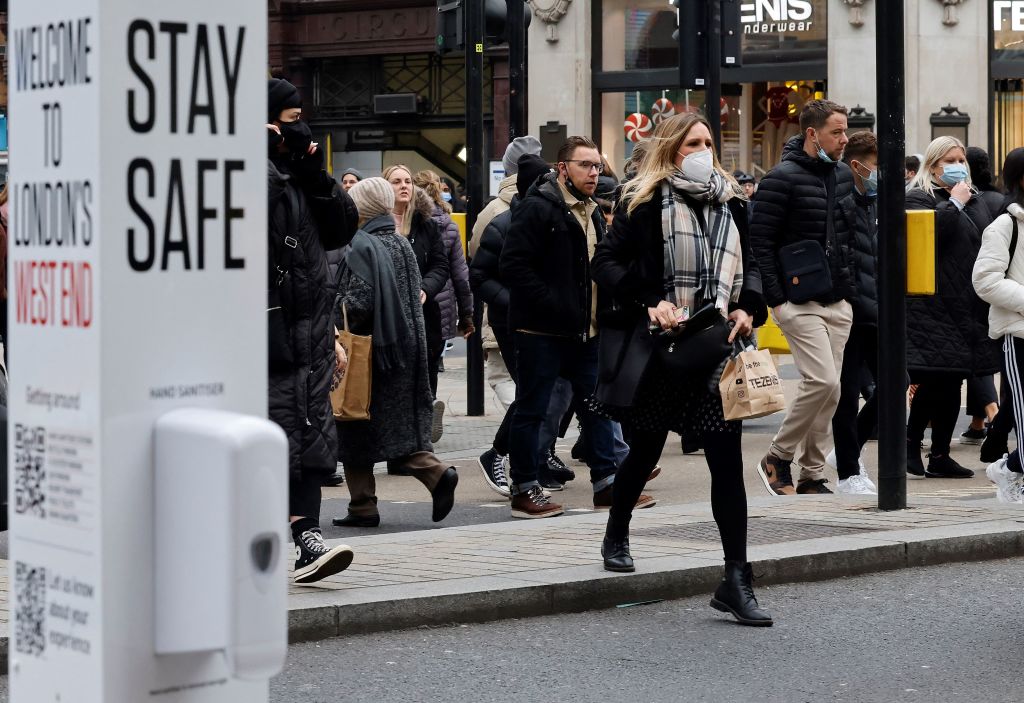3 new studies, with caveats, add to evidence Omicron is less severe than other COVID-19 variants


A free daily email with the biggest news stories of the day – and the best features from TheWeek.com
You are now subscribed
Your newsletter sign-up was successful
Thee separate studies out of England, Scotland, and South Africa on Wednesday suggested the new Omicron coronavirus is less likely to send people to the hospital and usually produces milder symptoms. The Omicron variant is also infecting more people at a much faster rate, among other caveats, so "this is a qualified good-news story," said Jim McMenamin, national COVID-19 incident director at Public Health Scotland and a co-author of the Scottish study.
"Cautious optimism is perhaps the best way to look at" these new studies, Manuel Ascano Jr., a virus researcher at Vanderbilt University, tells The Associated Press. "It is clearly good news, to a degree," said Neil Ferguson, who led the English research team at Imperial College London.
In South Africa, where the sharp surge in Omicron cases appears to have peaked and started to decline after a month, researchers found that people infected with Omicron had a roughly 70 percent lower risk of hospitalization versus other variants. The Scottish study, from a team at University of Edinburgh, found Omicron patients were two-thirds less likely to be hospitalized than Delta patients.
The Week
Escape your echo chamber. Get the facts behind the news, plus analysis from multiple perspectives.

Sign up for The Week's Free Newsletters
From our morning news briefing to a weekly Good News Newsletter, get the best of The Week delivered directly to your inbox.
From our morning news briefing to a weekly Good News Newsletter, get the best of The Week delivered directly to your inbox.
The Imperial College researchers found that those infected with Omicron were 15 to 20 percent less likely to go to the emergency room and 40 percent less likely to be hospitalized overnight. Their analysis also found that Omicron's mutations made it intrinsically milder than Delta, BBC News reports. But Omicron hospitalizations are also believed to be stalling because majorities of the populations under study have some immunity from vaccines or previous infections.
The Imperial College team estimated that people with no prior immunity were only about 11 percent less likely to visit the ER with Omicron than Delta. The Scottish study found the odds of being reinfected are 10 times higher with Omicron than Delta, but that vaccines still provide some protection against symptomatic infection, especially if you got a third dose. Given the vigorous transmissibility of Omicron, hospitals are still expected to become overwhelmed, but mostly with unvaccinated people.
"If you are unvaccinated and you have never been infected, it is a little less severe than Delta," William Hanage, an epidemiologist at the Harvard T.H. Chan School of Public Health, tells The New York Times. "But that's a bit like saying you're being hit over the head with one hammer instead of two hammers. And the hammers are more likely to hit you now."
A free daily email with the biggest news stories of the day – and the best features from TheWeek.com
Peter has worked as a news and culture writer and editor at The Week since the site's launch in 2008. He covers politics, world affairs, religion and cultural currents. His journalism career began as a copy editor at a financial newswire and has included editorial positions at The New York Times Magazine, Facts on File, and Oregon State University.
-
 The Week Unwrapped: Do the Freemasons have too much sway in the police force?
The Week Unwrapped: Do the Freemasons have too much sway in the police force?Podcast Plus, what does the growing popularity of prediction markets mean for the future? And why are UK film and TV workers struggling?
-
 Properties of the week: pretty thatched cottages
Properties of the week: pretty thatched cottagesThe Week Recommends Featuring homes in West Sussex, Dorset and Suffolk
-
 The week’s best photos
The week’s best photosIn Pictures An explosive meal, a carnival of joy, and more
-
 A Nipah virus outbreak in India has brought back Covid-era surveillance
A Nipah virus outbreak in India has brought back Covid-era surveillanceUnder the radar The disease can spread through animals and humans
-
 Trump HHS slashes advised child vaccinations
Trump HHS slashes advised child vaccinationsSpeed Read In a widely condemned move, the CDC will now recommend that children get vaccinated against 11 communicable diseases, not 17
-
 Covid-19 mRNA vaccines could help fight cancer
Covid-19 mRNA vaccines could help fight cancerUnder the radar They boost the immune system
-
 FDA OKs generic abortion pill, riling the right
FDA OKs generic abortion pill, riling the rightSpeed Read The drug in question is a generic version of mifepristone, used to carry out two-thirds of US abortions
-
 The new Stratus Covid strain – and why it’s on the rise
The new Stratus Covid strain – and why it’s on the riseThe Explainer ‘No evidence’ new variant is more dangerous or that vaccines won’t work against it, say UK health experts
-
 RFK Jr. vaccine panel advises restricting MMRV shot
RFK Jr. vaccine panel advises restricting MMRV shotSpeed Read The committee voted to restrict access to a childhood vaccine against chickenpox
-
 Texas declares end to measles outbreak
Texas declares end to measles outbreakSpeed Read The vaccine-preventable disease is still spreading in neighboring states, Mexico and Canada
-
 RFK Jr. shuts down mRNA vaccine funding at agency
RFK Jr. shuts down mRNA vaccine funding at agencySpeed Read The decision canceled or modified 22 projects, primarily for work on vaccines and therapeutics for respiratory viruses
